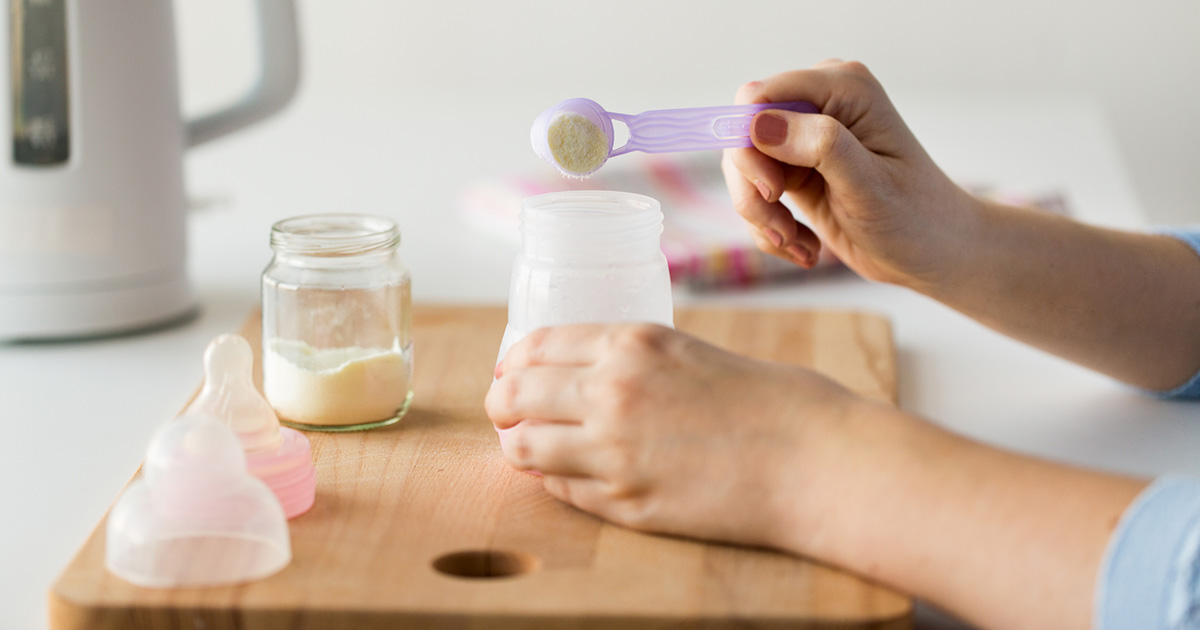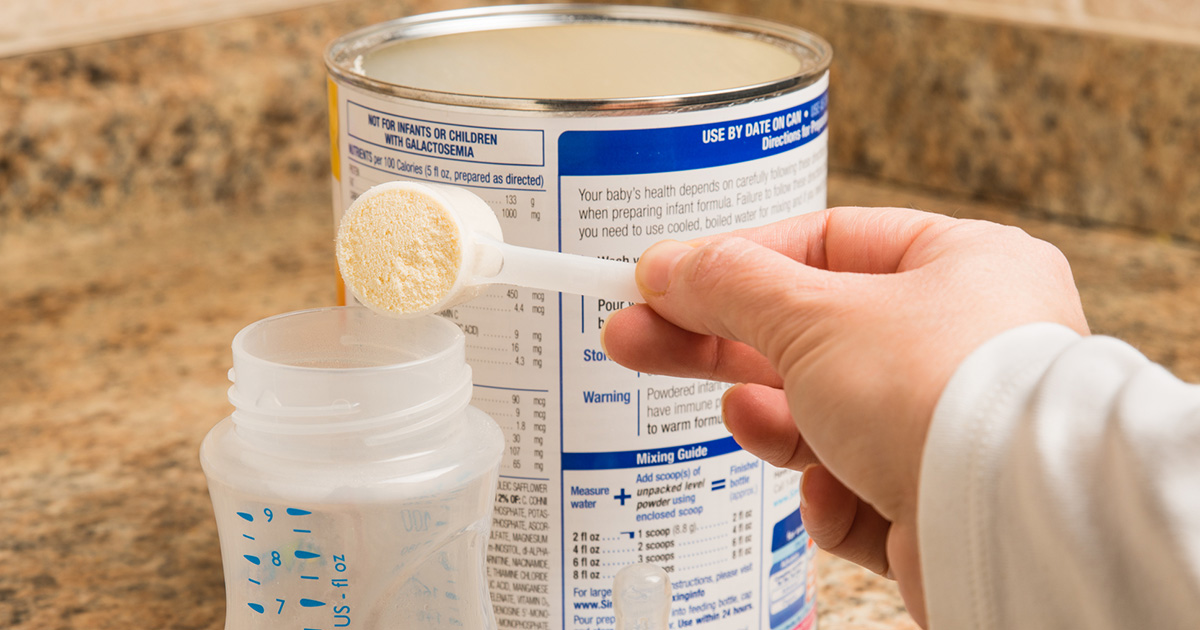Breastfeeding Versus Formula: Which Is Best For Your Baby?
Deciding between breastfeeding or bottle-feeding is a personal decision many new parents face when they are about to bring new life into the world. It is one of the first significant parenting decisions a new mom will make, and knowing all the facts about both options can greatly help with making this important choice. Both breastfeeding and bottle-feeding have positive and negative aspects, especially with parents 'mommy-shaming' mothers who choose bottle-fed formula over breast milk. Learn more now about the positive and negative aspects of breastfeeding and bottle-feeding, the right time to wean a baby, and which is considered best based on this criteria. There is no right or wrong choice, just the healthiest choice for both mother and child!
Why Breast Is Best

Trusted health organizations such as The World Health Organization (WHO), The American Academy Of Pediatrics (AAP), and The American Medical Association (AMA), all recommend breast milk as the best food source for nourishing newborns and infants. According to the AAP, infants should be breastfed exclusively for the first four to six months of their life, and a combination of breastfeeding with solid foods until the age of one. Breastfeeding is highly beneficial for both the mother and baby's health, as there are numerous benefits associated with breastmilk and the physical act of breastfeeding itself. One of the primary benefits is it allows mother and child to bond emotionally due to the intimate act of nourishing the child through their body, similar to when the infant was in utero.
Breast Is Best Continued

The various benefits of breastfeeding include it is always available, it's free, there is no prep work involved, it contains active infection-fighting white blood cells and natural chemicals that increase the protection against infections in the first months of life, and it can help prevent sudden infant death syndrome (SIDS). Other benefits of breast milk include that it contains the right amount of nutrients the baby needs to grow and thrive including protein, carbohydrates, fat, and calcium, it is easily digestible, it may protect the infant from developing allergies and asthma in the future.
Breast milk may also decrease the child's risk of obesity, it contains fatty acids that promote brain development, and breastfeeding can help new moms lose weight more effectively. Breast milk also promotes a healthy digestive system and reduces the risk of the baby having diarrhea and an upset stomach; strengthens the baby's immune system and protects against ear infections, pneumonia, bacterial and viral infections which is vital in the first few months of life; and it might boost the child's IQ compared to formula-fed babies. In addition to helping new moms lose weight, breastfeeding reduces a woman's risk of developing breast cancer, ovarian cancer, heart disease, and diabetes.
Still curious about breastfeeding? Keep reading to discover some of the negative effects of breastfeeding for both mother and child.
The Negative Side Effects Of Breastfeeding

Although breast appears to be the best option for the baby's health as well as the mother's, it can come with multiple challenges. To start, a new mother can feel discomfort, particularly during the first few feedings, which can greatly discourage a new mom from pursuing breastfeeding further. Another negative aspect of breastfeeding is there is no sure way to measure how much the baby is eating and if they are getting enough. The mother also needs to be aware of and monitor their medication use, caffeine and alcohol intake, as some things that go into the mother's body, such as what they eat or drink, can be passed to the baby through her milk. Newborns also eat quite frequently and sticking to a feeding schedule can be challenging if a new mom returns to work, needs to run errands, has chores, or has other lifestyle choices that may take up her time. Also, the infant may have difficulty latching onto the nipple and could have a sensitive stomach and be allergic to their mother's milk.
Next, learn about the other choice new moms have when it comes to feeding their newborn: formula.
Formula: A Great Alternative

In some cases, a new mom might have a difficult time breastfeeding for various reasons, and bottle-feeding is a great option for a new mother. Bottle-feeding can be either feeding the infant breast milk from a bottle or using formula instead. For these reasons, formula can be integrated and used as the baby's main source of nourishment and is a healthy alternative to breastmilk. Although manufactured and regulated by the Food and Drug Administration (FDA), infant formula contains an incredible amount of nutrients a growing baby needs.
Benefits of baby formula include another person can feed the baby and feedings do not rely solely on the mother being present, other family members get the chance to bond with the baby during feeding time, the amount the baby is consuming can be measured and monitored, and mothers using formula do not need to worry about how their diet will affect the baby. Also, if the baby has a milk allergy, a soy-based formula can be supplemented and a healthy alternative if the child is allergic to their mother's milk. With the advancement in formula, many formulas available on the market can match the nutrients of human milk and can offer some protection for newborns against infections within the first year. New moms should also know a happy, stress-free mom is best, and if the mom believes formula is the best option for her and her child, then she should pursue it.
Although a great alternative for baby and mama, infant formula does have some negative side effects compared to breast milk. Continue reading to find out now!
The Downside Of Using Formula

Despite the advancement in the production of formula to make it incredibly similar to breastmilk with its nutrient content, formula still has numerous drawbacks moms should be aware of when considering it to feed their infant. For one, formula cannot provide a baby with the complete nutrition their body needs when compared to breast milk, as breast milk will often adapt to what the baby's body needs, whereas formula is not as adaptable. Also, not all brands of formula offer the same amount of nutrients and minerals and the same protection against various infections as breast milk would. Other drawbacks to formula include that it needs to be prepared and at the right temperature for consumption, bottles, formula, rubber nipples, and breast pumps can be expensive, and formula can cause digestive issue such as constipation and gas for some infants.
If formula is the route you plan to choose, keep reading to find out some helpful tips that can help you pick the right formula for your baby.
Tips For Choosing The Right Formula

When it comes to baby formula, there are many varieties and brands available today ranging from formula with extra iron or omega-3s for growth and development to formula that is lactose-free and soy-based for infants with an allergy. New moms should know they should not hesitate to pick a less expensive brand of formula if finances are a factor they need to consider, as most formulas are typically produced the same way. The more expensive a brand of formula is does not necessarily mean it is better for a baby!
The next helpful hint is to avoid low-iron formulas and parents should check the formula is iron fortified, as there is evidence an iron deficiency in the first years of life can adversely affect a child's brain development, and side effects from iron, such as gas, constipation, and discomfort are rare. New parents should also pick a type of formula that fits their needs, whether it be powder, concentrate, or ready-to-feed, as there is no real nutrition difference between them, although powdered formula generally tends to be less expensive compared to the other options. Lastly, parents should try to choose and feed their baby cow's milk formula over soy to begin with, however, as previously mentioned, if the baby is lactose-intolerant or has another milk allergy, soy is a great alternative.
Next, find out when it is the right time to wean your baby, whether it be from breastfeeding or bottle-feeding.
The Right Time To Wean

At some point or another, every new mom will have to begin the process of weaning, which means to completely stop feeding an infant breast milk or formula and begin to introduce them to more solid foods. The typical time frame for weaning is between nine to twelve months or later, depending on how comfortable the mother and child are with continuing to breastfeed or bottle-feed. The general rule is babies should have only breast milk or fortified formula for the first six months of life, and be weaned slowly afterward. Even when introducing new foods into the infant's diet, a doctor may recommend the mom allows the baby to continue to drink milk to ensure they are still getting the right amount of nutrients a growing baby needs to be healthy. The World Health Organization recommends continuing breastfeeding as an additional food source for up to two years or longer.
When it comes to weaning, particularly with breastfeeding, some moms will follow the child's lead and let them decide when to reduce breastfeeding, while other moms will opt to begin the weaning process themselves, which can be difficult if the baby intends to continue breastfeeding. Moms should start slowly and gradually reduce the amount they are feeding their baby over time, whether it is through breast milk or from a bottle. Not only does this help the baby adapt to their new routine, but it helps the mother's body get used to producing less milk and eventually stopping production altogether. Moms can try eliminating daytime feedings at first, as babies tend to be more attached to the first and last feedings of the day, and gradually stop those feedings at the right time.
Now that we have all the information, which is best? Breast or bottle? Continue reading to discover the answer!
Which Is Best?

In some cases, some new moms are not able to breastfeed for medical reasons, or it is just plain uncomfortable for them and the baby. Some new mommies might also have a demanding schedule that is not flexible enough than what is necessary for breastfeeding. Knowing the facts about breast milk and formula and deciding what is best for you and your baby ahead of time can help ease any stress and anxiety you may be experiencing when it comes to this debate. If you are having trouble making the 'right' choice, it might be helpful to talk to your doctor or a lactation profession for advice. At the end of the day, this is your decision, and you should do what feels best for your family.
Ultimately, there are both pros and cons for breast milk and formula, and either one is a great option to ensure your baby gets the proper nourishment for them to grow and thrive in life!
